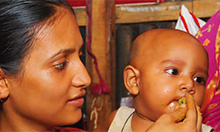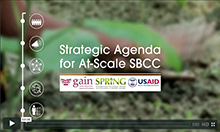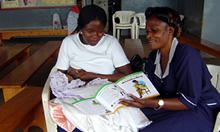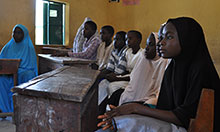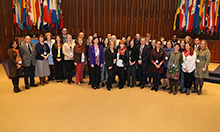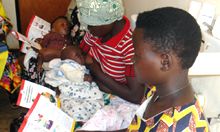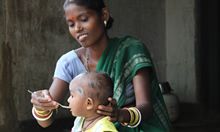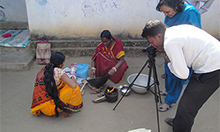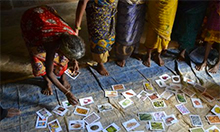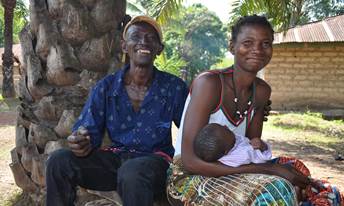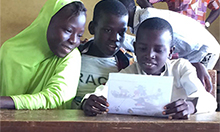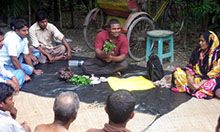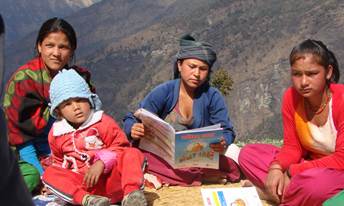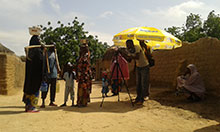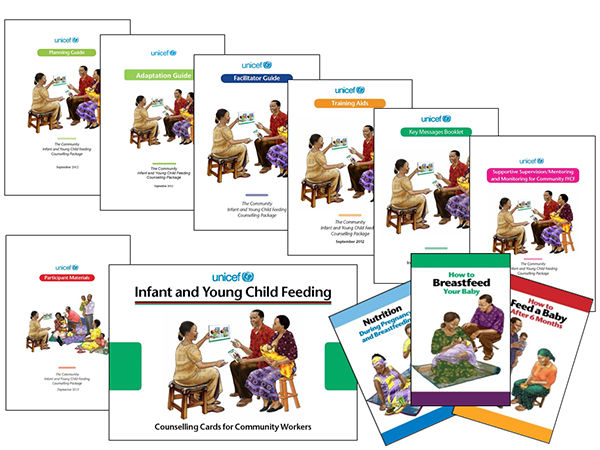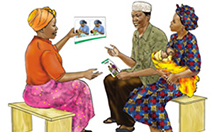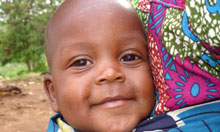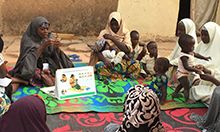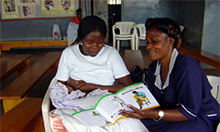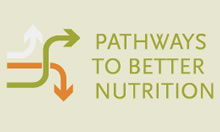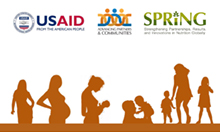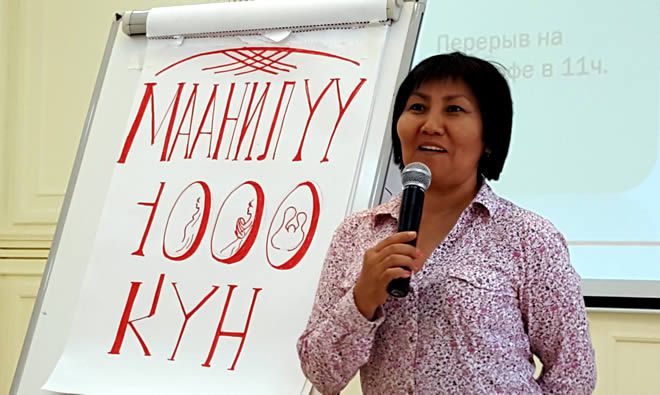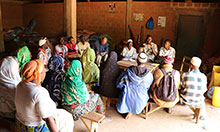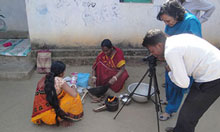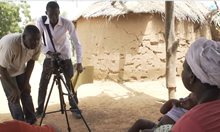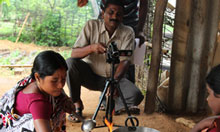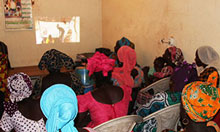How Do Programs Catalyze Change for Nutrition?
A Strategic Agenda for Nutrition Social and Behavior Change
Human behavior is complex. Generally, it takes a combination of influences to trigger a person to test, adopt, and ultimately internalize and sustain improved behaviors. Knowing this, it is important that programs incorporate best practices in social and behavior change (SBC) design, implementation, and monitoring. The Strategic Agenda for Nutrition Social and Behavior Change Communication (SBCC) is a blueprint for creating SBC programs that contribute to the widespread social and individual behavior changes needed to meet global nutrition commitments.
Developed by SPRING in partnership with USAID's Bureau for Global Health and the Global Alliance for Improved Nutrition (GAIN), the strategic agenda represents the collective experiences of many SBC partners. The actions of the strategic agenda are reflected in SPRING’s SBC programming and continue to guide future activities.
The strategic agenda is built around 5 action points that are fluid and mutually reinforce each other:
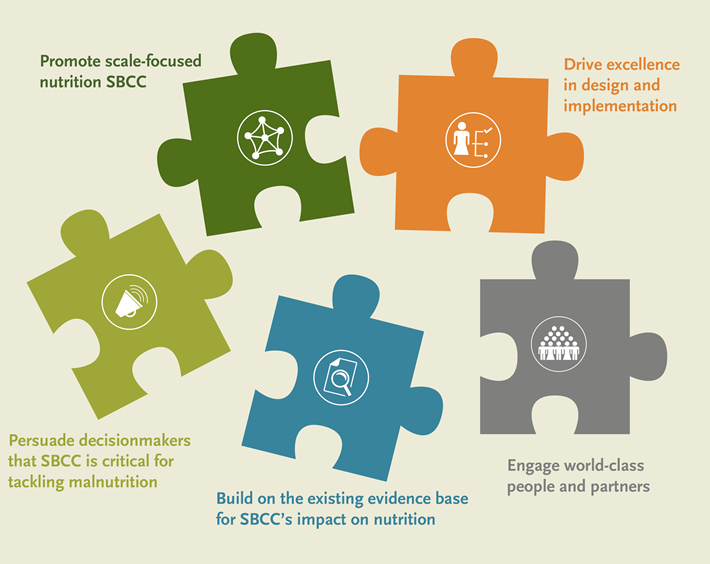
Designing the Future of Nutrition SBC
In early 2014, SPRING, USAID's Bureau for Global Health, and GAIN convened a working group of SBC thought-leaders to identify priority focus areas for achieving more and better nutrition SBC. Participants came from multiple sectors, including nutrition, health, WASH, HIV/AIDS, and private sector marketing.
In 2014, we held a conference in Washington, D.C. to synthesize best practices of research and implementation in nutrition SBC. We used these findings to develop a strategic agenda that would guide further programming and research to advance nutrition gains in SBC programs. SPRING has embraced the actions of the strategic agenda in our own programming and has worked to disseminate our experience with other SBC implementers.
 Action 1: Build on the existing evidence base for SBC impact on nutrition
Action 1: Build on the existing evidence base for SBC impact on nutrition
A strong evidence base in nutrition SBC already exists and defines many best practices. For well established areas like maternal, infant, and young child nutrition (MIYCN), and emerging areas like adolescent nutrition, we need to use it to innovate new approaches based on what works!
As we design and implement programs and evaluate our nutrition SBC work, SPRING explicitly states and tests theoretical frameworks, identifies success factors for replicating or scaling up interventions, and uses standard indicators to measure behavior and social change.
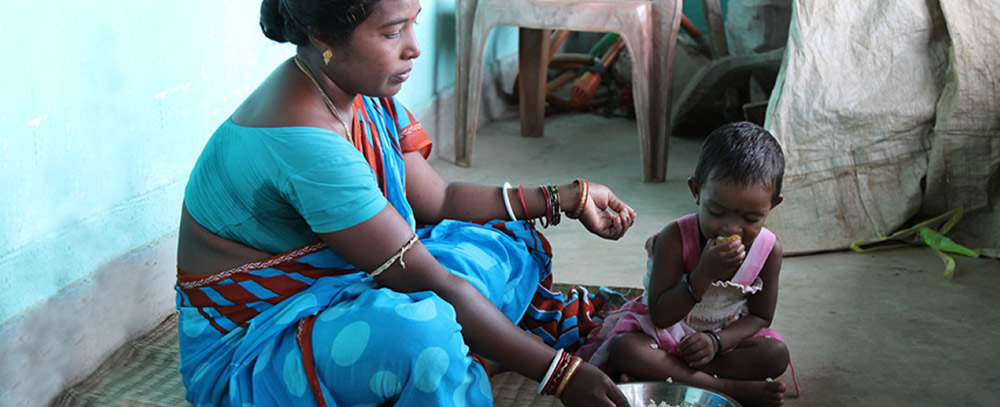
Evidence of Effective Approaches to Social and Behavior Change Communication for Preventing and Reducing Stunting and Anemia
In 2014, SPRING conducted a systematic literature review on the effectiveness of SBCC approaches on three outcomes: improving dietary practices of pregnant and lactating women, promoting breastfeeding practices, and improving complementary feeding practices.
The results of this literature review identified effective techniques and approaches in SBCC for nutrition as well as gaps in the evidence base that call for further research. A key finding from the review noted that using multiple approaches that reach multiple target audiences has a greater impact than singular approaches. This literature review was a key document used to develop the Strategic Agenda for At-Scale Nutrition SBCC.
 Action 2: Drive excellence in design and implementation
Action 2: Drive excellence in design and implementation
Excellence in SBC demands that projects design and implement interventions with the consumer at the center of every consideration. By involving community members in leading and evaluating community-based programs, we can build investment and excellence in program implementation for nutrition SBC.
SPRING uses a broad spectrum of formative research techniques and highly participatory community media interventions, to engage stakeholders and create high-quality tools and job aids that connect with users.
 Action 3: Promote scale-focused nutrition SBC
Action 3: Promote scale-focused nutrition SBC
Practicing and promoting nutrition SBC at scale are fundamental to achieve real gains in reducing malnutrition.
By integrating SBC into all interventions that impact nutrition, leveraging resources to build on existing systems, and implementing approaches with short-term behavior and long-term social changes, SPRING has demonstrated that nutrition SBC can be systematized and institutionalized.
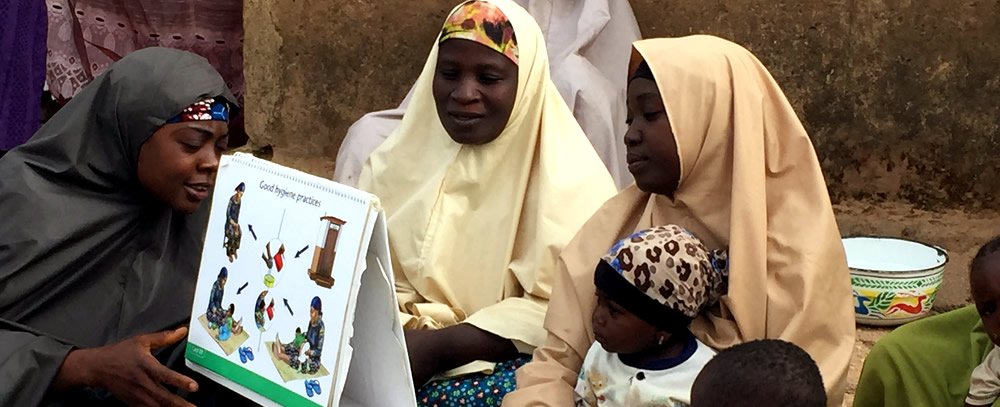
Nigeria C-IYCF Evaluation
In August 2013, Nigeria’s Federal Ministry of Health (FMOH) formally launched the Nigeria Community and Facility Infant and Young Child Feeding (IYCF) Counselling Package for use throughout Nigeria. The package of materials was adapted with support from SPRING from the generic UNICEF C-IYCF Counselling Package into six languages. SPRING supported the FMOH and its partners in the roll-out of the package across 16 states.
"Maternal, infant, and child health needs cannot be overemphasized. If you educate the woman, you educate the nation.
While over 60 countries, including Nigeria, have adapted the UNICEF C-IYCF Counselling Package to varying degrees, little research has been done to examine its impact. SPRING partnered with the Nigerian FMOH and UNICEF to evaluate the effectiveness of using the C-IYCF package in Kaduna State, Nigeria. The 18-month mixed-methods study assessed the impact of the package on MIYCN practices, knowledge, attitudes, and outcomes, as well as enabling factors for successful implementation.
 Action 4: Persuade decision-makers that SBC is critical for tackling nutrition
Action 4: Persuade decision-makers that SBC is critical for tackling nutrition
Effective work and research in SBC for nutrition are only part of the story. To achieve full impact, SBC practitioners should advocate with decision makers to emphasize the critical role that SBC plays in tackling malnutrition. Developing compelling documents that highlight the strong evidence for the efficacy of nutrition SBC and engaging tools that draw on this evidence helps to demonstrate potential, generate interest, and encourage continued funding for SBC nutrition activities.
SPRING has developed guidance tools for SBC practitioners as well as job aids and materials for all levels of implementers that contribute to these efforts.
 Action 5: Engage world-class people and partners
Action 5: Engage world-class people and partners
Individuals don't live in silos and neither should approaches to SBC interventions. By identifying and collaborating with multidisciplinary partners across public and private sectors, SBC practitioners have the potential to reach far beyond what a stand-alone approach can achieve.
SPRING has collaborated with partners in local and mass media, theater, and music, who are based around the world and across different sectors, to implement activities that focus on the unique character of each region where we work.
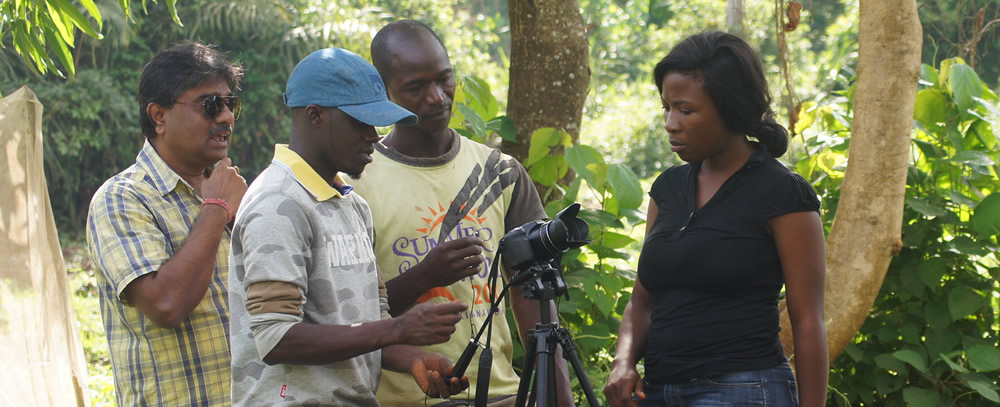
SPRING Collaboration in Community Video
In 2012, SPRING adapted a successfully used technique to improve community-based agriculture in India, and changed the focus to nutrition.
We worked with Digital Green, whose original community video approach involved local production of low-cost videos, active facilitation of video screenings, and follow-up home visits to support adoption of key practices. When SPRING partnered with Digital Green to adapt the platform for nutrition, we added formative research to the process, developed a maternal, infant, and young child nutrition training package, and trained community service providers.
SPRING first used the adaptation in India before expanding to Niger, Burkina Faso, Senegal, and Guinea. We are also supporting a Bill and Melinda Gates Foundation (BMGF)-funded randomized control trial to test the effectiveness of this approach for nutrition-sensitive and specific behaviors in Odisha, India, in partnership with the London School of Hygiene and Tropical Medicine (LSHTM), Digital Green, Voluntary Association for Rural Reconstruction and Appropriate Technology (VARRAT), Ekjut, and Development Corner (DCOR).
